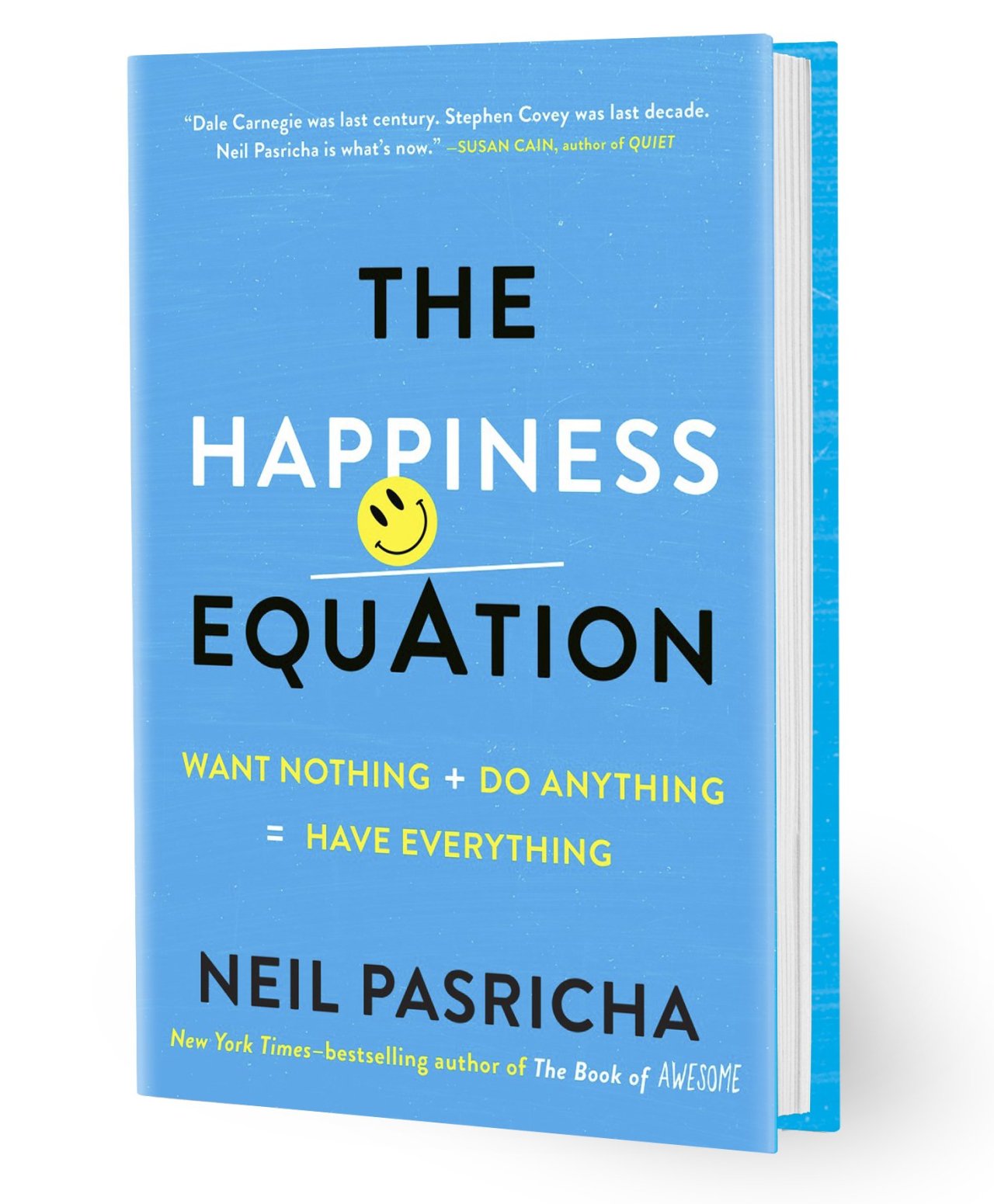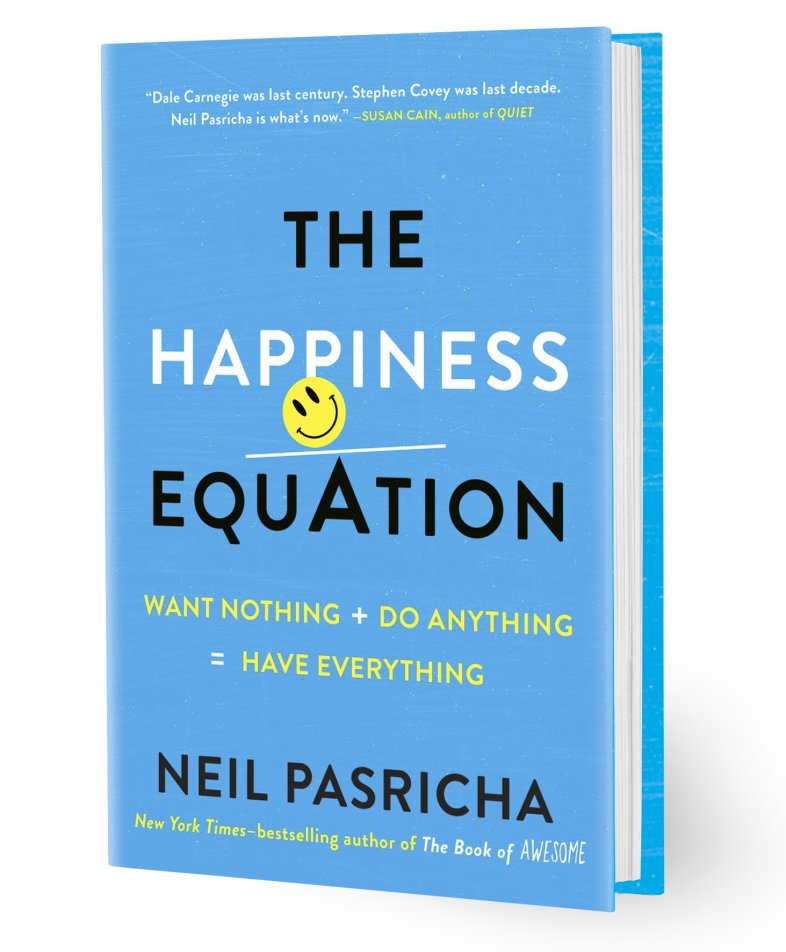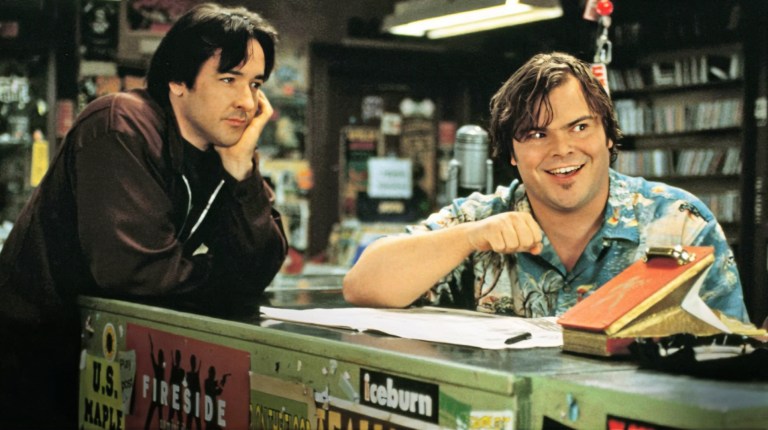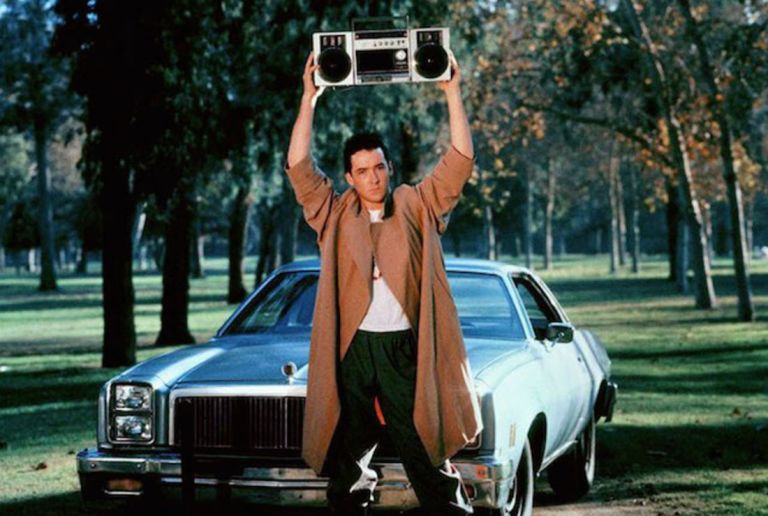
7 Ways To Be Happy Right Now
Adapted from the book The Happiness Equation by Neil Pasricha.

“For there is nothing either good or bad, but thinking makes it so.” —Shakespeare
Let’s start off with some bad news. The happiness model we’re taught from a young age is actually completely backward.
We think we work hard in order to achieve big success and then we’re happy.
We think life goes like this:
Great work → Big Success → Be Happy
Study hard! → Straight A’s! → Be happy!
Interview lots! → Great job! → Be happy!
Work overtime! → Get promoted! → Be happy!
But it doesn’t work like that in real life. That model is broken. We do great work, have a big success, but instead of being happy, we just set new goals. Now we study for the next job, the next degree, the next promotion. Why stop at a college degree when you can get a master’s? Why stop at Director when you can be VP? Why stop at one house when you can have two? We never get to happiness. It keeps getting pushed further and further away.
What happens when we snap “Be happy” off the end of this sequence and stick it on the beginning? Then these words look like this:
Be Happy → Great work → Big Success
Now everything changes. Everything changes. If we start with being happy, then we feel great. We look great. We exercise. We connect. What happens? We end up doing great work because we feel great doing it. What does great work lead to? Big success. Massive feelings of accomplishment and the resulting degrees, promotions, and phone calls from your mom telling you she’s proud of you.
Harvard Business Review reports that happy people are 31% more productive, have 37% higher sales, and are three times more creative than their counterparts.
So what’s the first thing you must do before you can be happy?
Be happy.
Be happy first. Being happy opens up your learning centers. Your brain will light up like Manhattan skyscrapers at dusk, sparkle like diamonds under jewelry store lights, glow like the stars in the black sky above a farmer’s field.
But how do you be happy first? We need to look to the emerging field of positive psychology. What’s that? It’s not fluffy lollipop experiments. Professors of psychology Martin Seligman and Mihaly Csikszentmihalyi are called the fathers of positive psychology because of their passion for cold hard facts. As they put it themselves in American Psychologist:
“Psychology is not just a branch of medicine concerned with illness or health; it is much larger. It is about work, education, insight, love, growth, and play. And in this quest for what is best, positive psychology does not rely on wishful thinking, faith, self-deception, fads, or hand-waving; it tries to adapt what is best in the scientific method to the unique problems that human behavior presents to those who wish to understand it in all its complexity.”
Positive psychology is a new and growing field. I have sifted through hundreds of studies to find the Big 7 ways to train your brain to be happy. Many of these studies have been discussed in journals, conference keynotes, and research reports, but I’ve brought them together for you here.
If you do any of these seven things for two straight weeks, you will feel happier.
So what are the Big 7?
1. Three Walks
Pennsylvania State researchers reported in the Journal of Sport & Exercise Psychology that the more physically active people are, the greater their general feelings of excitement and enthusiasm. Researcher Amanda Hyde reports, “We found that people who are more physically active have more pleasant-activated feelings than people who are less active, and we also found that people have more pleasant-activated feelings on days when they are more physically active than usual.” It doesn’t take much: half an hour of brisk walking three times a week improves happiness. The American Psychosomatic Society published a study showing how Michael Babyak and a team of doctors found that three thirty-minute brisk walks or jogs even improve recovery from clinical depression. Yes, clinical depression. Results were stronger than studies using medication or studies using exercise and medication combined.
2. The 20-Minute Replay
Writing for twenty minutes about a positive experience dramatically improves happiness. Why? Because you actually relive the experience as you’re writing it and then relive it every time you read it. Your brain sends you back. In a University of Texas study called “How Do I Love Thee? Let Me Count the Words,” researchers Richard Slatcher and James Pennebaker had one member of a couple write about their relationship for twenty minutes three times a day. Compared to the test group, the couple was more likely to engage in intimate dialogue afterward and the relationship was more likely to last. What does the 20-Minute Replay do? It helps us remember things we like about people and experiences in our lives.
3. Random Acts of Kindness
Carrying out five random acts of kindness a week dramatically improves your happiness. We don’t naturally think about paying for someone’s coffee, mowing your neighbor’s lawn, or writing a thank you note to your apartment building security guard at Christmas. But Sonja Lyubomirsky, author of The How of Happiness, did a study asking Stanford students to perform five random acts of kindness over a week. Not surprisingly, they reported much higher happiness levels than the test group. Why? They felt good about themselves! People appreciated them. In his book Flourish, Professor Martin Seligman says that “we scientists have found that doing a kindness produces the single most reliable momentary increase in well-being of any exercise we have tested.”
4. A Complete Unplug
“The richest, happiest and most productive lives are characterized by the ability to fully engage in the challenge at hand, but also to disengage periodically and seek renewal,” say Jim Loehr and Tony Schwartz in The Power of Full Engagement. And a Kansas State University study found that complete downtime after work helps us recharge for the next day. Turning your phone off after dinner. Not using the Internet on vacation. There’s a lot more to this, and we’re going to chat about it in Secret #6. If you can’t wait, flip to page TK.
5. Hit Flow
Get into a groove. Be in the zone. Find your flow. However you characterize it, when you’re completely absorbed with what you’re doing it means you’re being challenged and demonstrating skill at the same time. Mihaly Csikszentmihalyi describes this moment as “being completely involved in an activity for its own sake. The ego falls away. Time flies. Every action, movement, and thought follows inevitably from the previous one, like playing jazz. Your whole being is involved, and you’re using your skills to the utmost.”
6. 2-Minute Meditations
A research team from Massachusetts General Hospital looked at brain scans of people before and after they participated in a course on mindfulness meditation and published the results in Psychiatry Research. What happened? After the course, parts of the brain associated with compassion and self-awareness grew while parts associated with stress shrank. Studies reported that meditation can “permanently rewire” your brain to raise levels of happiness.
7. Five Gratitudes
If you can be happy with simple things, then it will be simple to be happy. Find a book or a journal, or start a website, and write down three to five things you’re grateful for from the past week. I wrote five a week on 1000awesomethings.com. Some people write in a notebook by their bedside. Back in 2003, researchers Robert Emmons and Michael McCullough asked groups of students to write down five gratitudes, five hassles, or five events that happened over the past week for ten straight weeks. Guess what happened? The students who wrote five gratitudes were happier and physically healthier. Charles Dickens puts this well: “Reflect upon your present blessings, of which every man has many, not your past misfortunes, of which all men have some.”
* * *
Those are the Big 7. You know it’s important to be happy first, and these are the seven ways to get there. Remember: Just like driving a car, throwing a football, or doing a headstand—you can learn to be happier. ![]()











